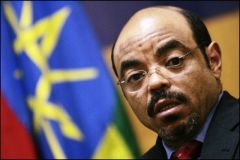Ethiopian Prime Minister extends demo ban
ADDIS ABABA, June 13 (AFP) — Ethiopian Prime Minister Meles Zenawi extended by one month a ban on demonstrations in the capital Addis Ababa after post-election clashes in the capital last week left at least 36 people dead.

In his first televised address to the nation since clashes erupted last Monday, Meles said his government regretted the deaths but renewed accusations that the opposition had been responsible for the violence.
“In light of what has happened last week … the government has decided to extend the demonstration ban until the next deadline on which the election board has decided to announce the results of the elections,” he said
The move means the ban, which had been due to expire in 48 hours, will remain in place until at least July 8 when the board is due to issue official results after considering nearly 300 complaints of vote rigging and fraud.
Meles had imposed a one-month ban on demonstrations in the capital and its environs shortly after polls closed in the disputed May 15 elections but students defied the order and began protesting alleged fraud last Monday.
The protests sparked a harsh police crackdown during which at least 36 people were killed, 35 of whom were shot dead when security forces opened fire on crowds in downtown Addis Ababa on Wednesday, and thousands arrested.
The government has blamed the opposition for inciting the illegal protests and violence and defended the actions of the police as necessary to preserve the peace, a position Meles maintained in his speech.
He accused “people who are trying to take power by the use of force” for the problems and said authorities believed “there is a need for the protection of peace and tranquility by the government in power.”
Meles added it had not been the government’s intent to use to deadly force to quell the demonstrations but stressed that it had had little choice because of criminal elements that he said had sought to take advantage of the chaos.
“We regret the loss of life which was not the desire of the government,” he said, maintaining that “violating the law of the country and agitating violence is unacceptable.”
The speech was delivered as government and opposition officials met with officials from the election board and the European Union in a bid to ease tension and agree on a method to handle the fraud complaints.
Foreign election observers, including an EU team, lauded the conduct and huge voter turnout on polling day but had expressed deepening concerns about post-vote developments and condemned the violence.
The country’s two main opposition groups have objected to the board’s release of allegedly tainted provisional results that show them with major gains but give Meles’ ruling Ethiopian People’s Revolutionary Democratic Front (EPRDF) a majority in parliament.
The EPRDF has conceded defeat in opposition strongholds, notably in Addis Ababa where it lost all 23 parliamentary seats and the entire city council, but insists it won the polls based on support from rural constituencies where 85 percent of the population live.
In his address, Meles said it was difficult to understand the opposition’s rationale for complaints given the acceptance of losses by his party, which has monopolized power in Ethiopia for the past 14 years.
“There was no reason for riots in Addis Ababa where EPRDF has conceded its defeat,” he said.
Earlier Monday, one of the main opposition groups said one of its lawmakers-elect had been shot and killed by police at the weekend south of the capital and a prominent party activist slain in the northeast.
Government officials could not be reached to comment on the report but the United Ethiopian Democratic Forces (UEDF) said it had been told by authorities that six police officers had been arrested in the killing of the MP-elect.
Also Monday, the Ethiopian Human Rights Council (EHRCO) said more than 3,000 opposition supporters and members had been detained in the vast crackdown launched by police after the protests began.
